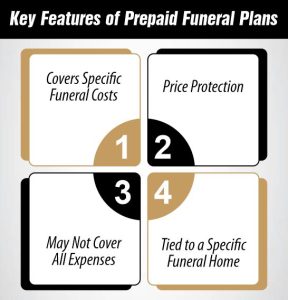Planning for end-of-life expenses is an essential part of financial planning, ensuring your loved ones aren’t burdened with costs after you pass. Two common options for covering funeral expenses are burial insurance and prepaid funeral plans. While both help cover final expenses, they work in different ways. Understanding their differences will help you decide which is best for your needs.
What is Burial Insurance?
Burial insurance, also known as final expense insurance, is a type of life insurance designed to cover funeral and burial costs. It provides a lump sum payout to your beneficiaries upon your passing, which they can use for any expenses related to your funeral, medical bills, or other outstanding debts.
Unlike traditional life insurance, burial insurance offers smaller coverage amounts, usually between $5,000 and $50,000, making it an affordable choice for seniors and those looking for basic end-of-life expense coverage. The application process is typically straightforward, with many policies not requiring a medical exam, making it accessible even for individuals with health concerns.
Key Features of Burial Insurance:
- Affordable Premiums: Usually lower than traditional life insurance policies, making it budget-friendly for seniors.
- Coverage Amounts: Typically ranges from $5,000 to $50,000, sufficient to cover funeral expenses and minor debts.
- Easy Qualification: Many policies don’t require a medical exam, allowing those with health conditions to obtain coverage.
- Flexible Use of Funds: Beneficiaries can use the payout for funeral costs, outstanding bills, or other personal needs.
- Policy Stays with You: Unlike prepaid funeral plans, this policy is not tied to a specific funeral home, giving your family flexibility in choosing the service provider.
What is a Prepaid Funeral Plan?
A prepaid funeral plan is an arrangement with a funeral home where you pay for funeral services in advance. This can be done in a lump sum or through installment payments. One of the key advantages of a prepaid funeral plan is that it locks in today’s prices for future services, protecting you from inflation and rising funeral costs.
With a prepaid funeral plan, you can make detailed funeral arrangements in advance, ensuring that your service is carried out according to your wishes. However, one major downside is that the plan is tied to a specific funeral home, meaning that if you move or change preferences, transferring the plan may not always be easy.
Key Features of Prepaid Funeral Plans:
- Covers Specific Funeral Costs: Includes services like embalming, casket, burial plot, cremation, and ceremony arrangements.
- Price Protection: Locks in prices, preventing inflation from affecting funeral costs over time.
- Customizable Services: Allows you to plan your funeral the way you want it, ensuring your wishes are met.
- May Not Cover All Expenses: Some additional costs (like flowers, obituary notices, or transportation) may not be included in the plan.
- Tied to a Specific Funeral Home: Funds are often managed by the funeral provider, limiting flexibility if circumstances change.

Comparing Burial Insurance and Prepaid Funeral Plans
While both options serve the purpose of covering funeral expenses, they have distinct differences. Here’s a breakdown of how they compare:
| Feature | Burial Insurance | Prepaid Funeral Plan |
| Payment Structure | Monthly premiums | Lump sum or installment payments |
| Coverage Flexibility | Funds can be used for any purpose | Covers only funeral-related services |
| Price Protection | Subject to inflation | Locked-in costs for specific services |
| Medical Exam Required? | Usually not required | Not applicable |
| Portability | Policy follows you | Limited to a specific funeral home |
| Beneficiaries | Pays to your loved ones | Pays directly to the funeral home |
Pros and Cons of Burial Insurance vs. Prepaid Funeral Plans
Pros of Burial Insurance:




Cons of Burial Insurance:


Pros of Prepaid Funeral Plans:



Cons of Prepaid Funeral Plans:



Who Should Choose Burial Insurance?
Burial insurance is a great option if you:
- Want a flexible payout that covers more than just funeral expenses.
- Prefer a policy that moves with you, ensuring coverage even if you relocate.
- Need easy qualification without a medical exam or strict requirements.
- Want your family to control and customize the funeral arrangements based on their preferences.
Who Should Choose a Prepaid Funeral Plan?
A prepaid funeral plan is better if you:
- Want to lock in current prices and avoid rising funeral costs due to inflation.
- Prefer to pre-arrange every detail of your funeral, ensuring your exact wishes are followed.
- Don’t want your family to worry about making funeral decisions during an emotional time.
Can You Have Both Burial Insurance and a Prepaid Funeral Plan?
Yes! Some individuals opt for both burial insurance and a prepaid funeral plan. This combination ensures that funeral expenses are covered while also providing additional financial support to loved ones. The prepaid funeral plan guarantees that your arrangements are handled as you wish, while burial insurance offers extra funds that can be used for any remaining expenses, debts, or financial support for your family.
FAQs
Can I cancel a prepaid funeral plan?
Yes, but the cancellation terms depend on the funeral home and contract. Some plans allow refunds, while others may deduct fees or be non-refundable.
Does burial insurance cover only funeral costs?
No, the payout can be used for any purpose, including medical bills, outstanding debts, or other final expenses, depending on the beneficiary’s needs.
What happens if I move after purchasing a prepaid funeral plan?
Since prepaid plans are tied to specific funeral homes, transferring them can be difficult. Some providers allow transfers, but additional costs may apply.
Is burial insurance more expensive than prepaid funeral plans?
It depends. Burial insurance involves ongoing premiums, which may add up over time. A prepaid funeral plan is a one-time or installment payment but is limited to specific services.
Can my family receive money from a prepaid funeral plan?
No, the funds go directly to the funeral home to cover the agreed-upon services. If you want your family to have financial flexibility, burial insurance is the better option.
Conclusion
Both burial insurance and prepaid funeral plans serve an important purpose in end-of-life financial planning. If you want flexibility and financial security for your family, burial insurance is a great option. However, if you prefer to lock in costs and plan every detail in advance, a prepaid funeral plan may be a better fit.
Before making a decision, assess your financial situation, consider your long-term needs, and consult with a trusted advisor or insurance professional to ensure you choose the best solution for your specific circumstances.







